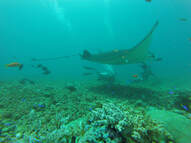 Advice to Beginner Divers, Advanced Divers, and Scuba Instructors. Scuba diving is an exciting and rewarding activity that allows you to explore the underwater world and see marine life up close. If you are a beginner scuba diver, here are some tips and advice to help you get started:
If you are an experienced, advanced scuba diver, here are some tips and advice to help you continue to improve your skills and stay safe: These are great to remember if you are Scuba Diving in Komodo National park as well.
If you are a scuba diving instructor, here are some tips and advice to help you effectively teach and mentor your students:
0 Comments
Leave a Reply. |
Details
AuthorI have been in the scuba diving industry in Komodo National Park for more than 10 years. Archives
June 2023
Categories |
- Komodo Island Tours & Diving
-
Komodo Day Trips
-
LIve-Aboard Packages
-
Scuba Dive Komodo
- Open Water Course Certification
- Advanced Adventurer Course
- Try Scuba Diving in Komodo
- Our Komodo Daily Diving Boat "Global Nomad"
- Komodo Tour 3 Days 2 Nights
- Scuba Diving Prices
- Top 10 Komodo Scuba Diving Locations >
-
Scuba Diving FAQ
>
- What Scuba Courses Do You Offer? >
- Komodo Scuba Diving Etiquette >
-
Proper Dive Planning in Komodo National Park
>
- Tips for Beginner Scuba divers in Komodo >
- Benefits of scuba diving for your health and well-being >
- Scuba Diving Regulators
- Our Favorite Dive Computers (Best Scuba Dive Computers
- Our Top Scuba Mask for Komodo National Park
- Recommended Wetsuits for Scuba Diving In Komodo
- Find the Best Fins for Diving Komodo
- The Role of Coral Reefs in Komodo
- Plastic Pollution in Komodo National Park
- What can you see Scuba Diving in Komodo National Park? >
- Scuba Diving Padar
- Underwater Photography in Komodo >
- Combo Tour/ Komodo/ Leisure/ Diving
- The Ultimate Guide to Komodo Scuba Diving >
- Komodo Locations
- Wae Rebo/Komodo Discovery
- Flores Overland Trips
-
Komodo Map
- General Information About Komodo Island >
-
Things to do in Komodo
>
- Mastering Photography techniques in Komodo National park and Padar
- Komodo Island Adventure Activities >
- Scuba Diving From Menjaga Bay
- Festivals and Events in Komodo National Park
- Komodo (Flores) Youth Retreat
- Komodo Island Hotels
- Weather and Climate Information for Travellers to Komodo National Park
- Komodo Dragons Information >
- Komodo Island Trekking Guide >
- Komodo National Park Wildlife Guide >
- Komodo Island Environmental Conservation Guide >
- Top 5 Locations in Komodo for Leisure Boat Trips
- Top 5 Beaches in Komodo
- Komodo Island Tour Price
- Komodo National Park Information
- Labuan Bajo Trip
-
Komodo Island Tourism
- About Us
- Need Help with other services
- Komodo Island Tours Blogs
- Komodo Tours Blog
- Scuba Diving Komodo Blog
- Komodo National Park Information
-
Komodo Ultimate Guides
- The Ultimate guide to choosing a Mask and Fins in Komodo
- The Ultimate Guide to Understanding Mangarri culture in Komodo and Flores Indonesia
- The Ultimate Guide to Taking Quality Photography of Komodo Dragons
- Ultimate Guide to Komodo Macro Life
- The Ultimate Guide to Studying Fish in Komodo National Park
- Ultimate Guide to choosing a scuba tank
- Taking good photos in Komodo
- Komodo testimonies with Maika Komodo Tour & Diving
- Indonesia Facts
- The Flores Sea
- Pages of Interest for Maika Komodo Tour
- Best Diving Komodo 2024 - Maika Komodo Tour & Diving
- Best Komodo Tours 2024 - Explore Unique Itineraries with Maika
- Best Komodo Dive Sites 2024
- Komodo Island Diving
- Dive Center Komodo
 RSS Feed
RSS Feed
